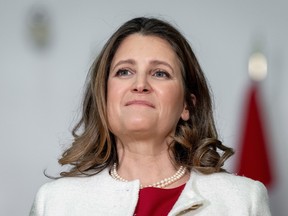The federal finance minister has ruled out tax increases on the middle class, but said nothing about possible corporate increases
Article content
OTTAWA — Even before she tables her fourth federal budget Tuesday, Finance Minister Chrystia Freeland has laid out billions in new spending, but the full financial picture could help her keep to deficit targets set last year, if only temporarily.
Unlike past budgets, where the details were kept secret until the day the document was tabled in Parliament, Freeland has spent the past three weeks revealing details of her coming fiscal plan.
Advertisement 2
Article content
Article content
She has announced a $500-million fund for youth mental health, $2.4 billion for artificial intelligence, $8.1 billion in new defence spending and $1 billion to expand school lunch programs.
Freeland has said the budget is about responding to younger Canadians who are struggling to get ahead, but insisted this help will not come at the expense of higher taxes.
“We recognize that there is an urgent need today to invest in Canada and Canadians, and we recognize in particular that we’re at really a pivotal moment for young Canadians, for generation, for Millennials, for General Z,” she said earlier this week. “We are not a government that will raise the tax burden on hard-working middle-class Canadians.”
The government has also pledged some bigger ticket items as loans: $15 billion for new apartment construction and $1 billion in loans for child-care centres. These items don’t add to the government’s direct budget deficit, though it is ultimately responsible.
Freeland has said that the budget will not increase the $40-billion deficit forecast last year.
She may be able to keep that promise because many of the big ticket items are spread over several years. The largest dollar figure so far, $8.1 billion for defence, is spread over five years and based on previous budgets much of it will fall in later years.
Article content
Advertisement 3
Article content
Even small items like the $15 million tenant protection fund for Legal Aid organizations to help renters in disputes with landlords is spread over five years.
The full accounting of all of Freeland’s promises to date won’t be revealed until Tuesday’s budget, but all the items announced so far are likely to add up to less than $3 billion for the 2024-2025 fiscal year.
I think this budget will be quite a shell game to be honest, a very dishonest exercise about where we are
Treasury Board President Anita Anand asked departments last year to find $15 billion that could be reallocated. That effort found $2.25 billion the government could move around in next year’s budget.
Kevin Page, a former parliamentary budget officer who now leads the Institute of Fiscal Studies and Democracy at the University of Ottawa, said what has been announced would only modestly add to the deficit.
He said the government will also be helped balancing the books with a better than expected economy. In the fall economic update, the government was predicting GDP to grow by just 0.4 per cent, whereas the Bank of Canada now expects Canada’s economy will grow 1.5 per cent this year. Unemployment is also lower than what was expected.
Advertisement 4
Article content
Page said those better than expected numbers can have a big impact.
“We’ve been waiting for this more significant economic slowdown, and we didn’t see it in 2023 and now into 2024. As we saw from the Bank of Canada, they revised up their growth projections, so that means a bigger economy and means more revenues,” he said.
He said that extra growth could easily cover this increased spending the Liberals have announced.
“You have a full percentage point of growth and you can easily get $5 billion, $6 billion, even $8 billion in additional revenues,” he said.
Robert Asselin, a senior vice-president at the Business Council of Canada, said moving money around and reprofiling it to later years really just shifts the problems.
“I think this budget will be quite a shell game to be honest, a very dishonest exercise about where we are,” he said.
Asselin, who previously worked for former Liberal finance minister Bill Morneau, said the government may be able to get through next year without a tax increase, but future year spending will force the Liberals’ hand.
“They will, in my opinion, raise taxes and I do think they will go either on surtax on the big corporations or they will do what they call the wealth tax.”
Advertisement 5
Article content
He said a tax on corporations will ultimately be passed along to consumers and cautioned that a wealth tax is incredibly difficult to actually manage, because the wealthy have the ability to move their money.
National Post
rtumilty@postmedia.com
Recommended from Editorial
Our website is the place for the latest breaking news, exclusive scoops, longreads and provocative commentary. Please bookmark nationalpost.com and sign up for our politics newsletter, First Reading, here.
Article content









